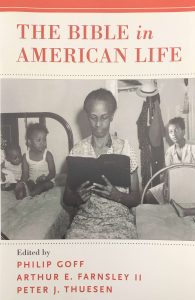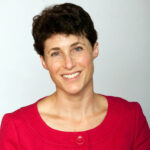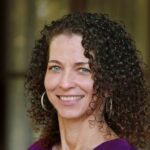Religion & Secularism
January 25th, 2024
Study of the secular and secularism has always been of interest to thinkers and theorists of religion. In a moment when the traditional boundaries between religion and the secular continue to be blurred, the time is ripe to return to this category, examine emerging theorists and theorizations, and explore its continued usefulness. The panel will explore its many and varied meanings and how different constructions of the secular help us narrate contemporary phenomena. They will explore the ways that secularism not only help us theorize what some have called the “losing of religion” but also the reconfiguring of traditional and new religious movements. Additionally, this panel will discuss why the current evangelical revival, discourses on Afro-pessimism, and rising political partisanship cannot be read apart from histories of and discourses on the secular. Join us as we explore these and other critical questions at the intersection of secularism, the study of religion, and American culture.
Click Here for resources from the panelists
Click Here for teaching resources for this video
Host
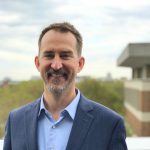 Brian Steensland, Professor and Chair of Sociology, IUPUI
Brian Steensland, Professor and Chair of Sociology, IUPUI
Dr. Steensland’s areas of interest include religion, culture, politics, and civic life in contemporary American society. His books include Situating Spirituality: Context, Practice, and Power (Oxford, 2022), co-edited with Jaime Kucinskas and Anna Sun; The New Evangelical Social Engagement (Oxford, 2014), co-edited with Philip Goff; and The Failed Welfare Revolution: America’s Struggle over Guaranteed Income Policy (Princeton, 2008). His articles include “The Measure of American Religion” (Social Forces, 2000) and “Cultural Categories and the American Welfare State” (American Journal of Sociology, 2006). (For additional information, see briansteensland.com.)
Panelists
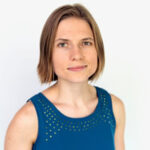 Lucia Hulsether, Assistant Professor of Religious Studies, Skidmore College
Lucia Hulsether, Assistant Professor of Religious Studies, Skidmore College
Lucia Hulsether is an ethnographer and historian of religion committed to a enacting a democratic praxis in her teaching and her research. She works at the intersection of critical race and ethnic studies, feminist and queer theory, and the study of labor and capitalism. Her research is focused on the religious cultures of the Americas. She interprets this topic broadly, to encompass ritual practices and collective forms through which people organize their lives and articulate their values. Her first book, tentatively titled Liberated Market: On the Cultural Politics of Capitalist Humanitarianism, is about transnational “conscious capitalist” initiatives like fair trade, microfinance, and corporate social responsibility. She is also pursuing projects on the intellectual cultures of college policy debate competition and on the gendered history of U.S. civic education programs.
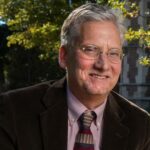 Leigh Eric Schmidt, Edward C. Mallinckrodt Distinguished University Professor in the Humanities, Washington University in St. Louis
Leigh Eric Schmidt, Edward C. Mallinckrodt Distinguished University Professor in the Humanities, Washington University in St. Louis
Dr. Schmidt is the author of Hearing Things: Religion, Illusion, and the American Enlightenment (Harvard, 2000), which won the American Academy of Religion Award for Excellence in Historical Studies and the John Hope Franklin Prize of the American Studies Association; Heaven’s Bride: The Unprintable Life of Ida C. Craddock, American Mystic, Scholar, Sexologist, Martyr, and Madwoman (Basic, 2010); and Restless Souls: The Making of American Spirituality (HarperOne, 2005). Dr. Schmidt has appeared on a number of NPR programs and other radio shows to discuss his books, including All Things Considered, Talk of the Nation, John Batchelor Show, Bob Edwards Show, BackStory with the American History Guys, Talking History, Voice of America, Religion Matters, Odyssey, The Connection, On Point, and The Book Show. He has often commented on current issues in American religion and culture, including for such media outlets as The Atlantic, The New York Times, The Wall Street Journal, Christian Science Monitor, Washington Post, London Times, Boston Globe, Dallas Morning News, Chicago Tribune, Hartford Courant, San Francisco Bay Guardian, U. S. News and World Report, Newsweek, Charlotte Observer, Atlanta Constitution, Newark Star-Ledger, San Bernardino Sun, Detroit Free Press, Raleigh News and Observer, Peoria Journal Star, San Diego Union Tribune, and the Religion News Service. He also serves on the editorial boards of the Journal of the American Academy of Religion, Religion and American Culture, Practical Matters, and Religion & Politics.
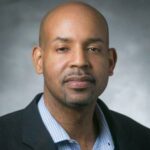 Joseph Winters, Alexander F. Hehmeyer Associate Professor of Religious Studies and African and African American Studies, Duke University
Joseph Winters, Alexander F. Hehmeyer Associate Professor of Religious Studies and African and African American Studies, Duke University
Joseph Winters is the Alexander F. Hehmeyer Associate Professor of Religious Studies and African and African American Studies. He also holds secondary positions in English and Gender, Sexuality, and Feminist Studies. His interests lie at the intersection of black religious thought, African-American literature, and critical theory. Overall, his project expands conventional understandings of black religiosity and black piety by drawing on resources from Af-Am literature, philosophy, and critical theory. His research examines how literature, film, and music (especially hip hop) can reconfigure our sense of the sacred and imagination of spirituality. Winters’ first book, Hope Draped in Black: Race, Melancholy, and the Agony of Progress (Duke University Press, June 2016) examines how black literature and aesthetic practices challenge post-racial fantasies and triumphant accounts of freedom. The book shows how authors like WEB Du Bois and Toni Morrison link hope and possibility to melancholy, remembrance, and a recalcitrant sense of the tragic. His second book project (under contract with Duke University Press) is called Disturbing Profanity: Hip Hop, Black Aesthetics, and the Volatile Sacred.
The Bible in American Life
There is a paradox in American Christianity. According to Gallup, nearly eight in ten Americans regard the Bible as either the literal word of God or the inspired by God. At the same time, surveys have revealed gaps in these same Americans’ biblical literacy. These discrepancies reveal the complex relationship between American Christians and Holy Writ, a subject that is widely acknowledged but rarely investigated.
The Bible in American Life is a sustained, collaborative reflection on the ways Americans use the Bible in their personal lives. It also considers how other influences, including religious communities and the internet, shape individuals’ comprehension of scripture. Employing both quantitative methods (the General Social Survey and the National Congregations Study) and qualitative research (historical studies for context), The Bible in American Life provides an unprecedented perspective on the Bible’s role outside of worship, in the lived religion of a broad cross-section of Americans both now and in the past.
The Bible has been central to Christian practice, and has functioned as a cultural touchstone, throughout American history, but too little is known about how people engage it every day. How do people read the Bible for themselves outside of worship? How have denominational and parachurch publications influenced the interpretation and application of scripture? How have clergy and congregations influenced individual understandings of scripture? These questions are especially pressing in a time when denominations are losing much of their traditional cultural authority, technology is changing reading and cognitive habits, and subjective experience is continuing to eclipse textual authority as the mark of true religion.
From the broadest scale imaginable, national survey data about all Americans, down to the smallest details, such as the portrayal of Noah and his ark in children’s Bibles, this book offers insight and illumination from scholars across the intellectual spectrum. It will be useful and informative for scholars seeking to understand changes in American Christianity as well as clergy seeking more effective ways to preach and teach about scripture in a changing environment.
Table of Contents
Introduction
Part One: Overview
1. “The Bible in American Life Today” by Philip Goff, Arthur Farnsley, and Peter Thuesen
Part Two: Past
2. “America’s First Bible: Native Uses, Abuses, and Re-uses of the Indian Bible of 1663” by Linford D. Fisher
3. “The Debate over Prophetic Evidence for the Authority of the Bible in Cotton Mather’s Biblia Americana” by Jan Stievermann
4. “Navigating the Loss of Interpretive Innocence: Reading the ‘Enlightenment’ Bible in Early Modern America” by Robert E. Brown
5. “Reading the Bible in a Romantic Era” by Beth Schweiger
6. “The Origins of Whiteness and the Black (Biblical) Imagination: The Bible in the ‘Slave Narrative’ Tradition” by Emerson B. Powery
7. “Biblical Women in the Woman’s Exponent: The Bible in Nineteenth-Century Mormonism” by Amy Easton-Flake
8. “Scriptualizing Religion and Ethnicity: The Circle Seven Koran” by Sylvester Johnson
9. “Reading the Bible in War and Crisis to Know the Future” by Matthew Avery Sutton
10. “Reference Bibles and Interpretive Authority” by B.M. Pietsch
11. “The Soul’s Train: The Bible and Southern Folk and Popular Music” by Paul Harvey
12. “Where Two or Three are Gathered: The Adult Bible Class Movement and the Social Life of Scripture” by Christopher D. Cantwell
13. “The Word is True: King James Onlyism and the Quest for Certainty in American Evangelical Life” by Jason A. Hentschel
14. “Selling Trust: The Living Bible and the Business of Biblicism” by Daniel Vaca
15. “The Bible and the Legacy of First Wave Feminism” by Claudia Setzer
16. “Let Us Be Attentive: The Orthodox Study Bible, Converts, and the Debate on Orthodox Lay Uses of Scripture” by Garrett Spivey
Part Three: Present
17. “The Continuing Distinctive Role of the Bible in American Lives: A Comparative Analysis” by Corwin Smidt
18. “Emerging Trends in American Children’s Bibles, 1990-2015” by Russell W. Dalton
19. “The Curious Case of the Christian Bible and the U.S. Constitution: Challenges for Educators Teaching the Bible in a Multi-Religious Context” by John F. Kutsko
20. “Transforming Practice: American Bible Reading in Digital Culture” by John B. Weaver
21. “Readers and their E-Bibles: The Shape and Authority of the Hypertext Canon” by Bryan Bibb
22. “How American Women and Men Read the Bible” by Amanda Friesen
23. “Feels Right Exegesis: Qualitative Research on How Millennials Read the Bible” by J. Derrick Lemons
24. “Crowning the King: The Use of Production and Reception Studies to Determine the Most Popular English-Language Bible Translation in Contemporary America” by Paul Gutjahr
25. “Literalism as Creativity: Intertextuality in Making a Biblical Theme Park” by James S. Bielo
26. “The Bible in the Evangelical Imagination” by Daniel Silliman
27. “Feeling the Word: Sensing Scripture at Salvation Mountain” by Sara M. Patterson
Part Four: Retrospective
28. “The Bible: Then and Now” by Mark Noll
Author Information
Philip Goff is the Director of the Center for the Study of Religion and American Culture and Chancellor’s Professor of Religious Studies, American Studies, and History at IUPUI. Since 2000, he has been co-editor of Religion and American Culture: A Journal of Interpretation. His current research is focused on the history of religious radio in the United States.
Arthur E Farnsley II is director of the Indiana University Center for Civic Literacy and Associate Director of the Center for the Study of Religion and American Culture at IUPUI. His books have been about the politics of the Southern Baptist Convention, the role of congregations in faith-based welfare reform, and the ways religious culture shapes and is shaped by urban growth and development. His popular writing has appeared in Christianity Today, Christian Century, and in newspapers across the country, as well as in his most recent book, Flea Market Jesus.
Peter J. Thuesen is Professor of Religious Studies at IUPUI and Co-Editor of Religion and American Culture: A Journal of Interpretation. His publications include Predestination: The American Career of a Contentious Doctrine (OUP) and In Discordance with the Scriptures: American Protestant Battles over Translating the Bible (OUP).
Contributors:
Philip Goff
Arthur Farnsley
Peter Thuesen
Linford D. Fisher
Jan Stievermann
Robert E. Brown
Beth Schweiger
Emerson B. Powery
Amy Easton-Flake
Sylvester Johnson
Matthew Avery Sutton
B.M. Pietsch
Paul Harvey
Christopher D. Cantwell
Jason A. Hentschel
Daniel Vaca
Claudia Setzer
Garrett Spivey
Corwin Smidt
Russell W. Dalton
John F. Kutsko
John B. Weaver
Bryan Bibb
Amanda Friesen
J. Derrick Lemons
Paul Gutjahr
James S. Bielo
Daniel Silliman
Sara M. Patterson
Mark Noll
Religion & Spirituality in Museums
April 21st , 2022
In foundational museum studies literature of the past 50 years, museums have been called “temples,” “sacred groves,” and places to connect with “something higher, more sacred, and out-of-the-ordinary.” How do museums today engage religion and spirituality, with whom, and why? Can encounters with objects and exhibits move people beyond the material world to consider the divine, the transcendent, the magical? In what ways do museums serve the growing number who consider themselves “spiritual but not religious,” those of different faiths, and those of no faith? In light of global challenges, how could museums contribute further to spiritual well-being as well as our collective future? Join four public-engaged scholar-practitioners of museum studies and/or religion to explore these intriguing questions and highlight the growing connections between religion, spirituality, and museums.
Click here for teaching resources for this video!
Host
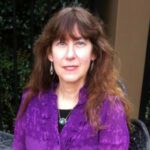 Lois H. Silverman, Professor of Museum Studies, Public Scholar of Museum Education, Indiana University-Purdue University Indianapolis
Lois H. Silverman, Professor of Museum Studies, Public Scholar of Museum Education, Indiana University-Purdue University Indianapolis
Lois H. Silverman’s research has addressed visitor meaning-making, museums and human needs, and museums as therapeutic agents. Her most recent book is The Social Work of Museums (Routledge, 2010). In her book, Silverman forges a framework of key social work perspectives to show how museums are evolving a needs-based approach to provide what promises to be universal social service. Lois’ current interests include museums, health, and well-being, the spiritual potential of museums, and the filed-wide need for more just and inclusive museum practices.
Panelists
 Eric Lewis Williams, Curator of Religion, National Museum of African American History and Culture
Eric Lewis Williams, Curator of Religion, National Museum of African American History and Culture
Eric Lewis Williams, is an ordained minister of the Church of God in Christ. He has taught history, religion and African-American studies at several institutions across the country. Williams currently serves as the Curator of Religion for the Smithsonian National Museum of African American History and Culture. His current research examines the meaning of religion within Africana histories and cultures and the role and influences of African religions in the Atlantic world. Additional research and teaching interests include Black Christian thought, American religious history, religion and material culture, African diasporan religions, Pentecostalism and phenomenology of religion. Williams’ research and studies have taken him around the world. He considers himself a transatlantic commuter, a collector of words and an emergent jazzman in the world of ideas.
 Yvonne Chireau, Professor of Religion, Swarthmore College
Yvonne Chireau, Professor of Religion, Swarthmore College
Yvonne Chireau is an authority on African-based religions such as Santeria and Voodoo in America, religion and healing, and black American religion. She is also interested in religion and comics, manga, and graphic novels. The author of Black Magic: African American Religion and the Conjuring Tradition (University of California Press, 2003), she has also co-edited, with Nathaniel Deutsch, Black Zion: African American Religions and Judaism (Oxford University Press, 1999). She has also published articles in several professional publications including the Journal of Feminist Studies in Religion, Journal of the Interdenominational Theological Center, and Religion and American Culture: A Journal of Interpretation.
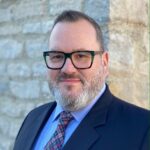
Ben Garcia, Executive Director, The American LGBTQ+ Museum
With more than 20 years of experience in museum leadership, development and intersectional LGBTQ+ advocacy, Ben leads The American LGBTQ+ Museum’s exhibition and program development, advocacy efforts, communications and community outreach, and fundraising. He is charged with bringing the American LGBTQ+ Museum into its next stage of growth as we work toward the opening of our physical home at the New-York Historical Society in 2024. Ben’s work has been focused on equity, representation, and decolonization in museum administration, exhibitions, and development initiatives. Currently, he is developing the American LGBTQ+ Museum’s first comprehensive fundraising campaign to fund exhibitions, educational programs, and operations.
https://youtu.be/_csrXB-6EZw
Religion & Teaching in the Public Sphere
May 19th, 2022
As the modern university transforms and there continues to be a growing appetite for the history and engagement of religion and religious subcultures, scholars of religion and American culture have increasing opportunities to present their research to a broad public. For this episode, we will focus on teaching outside of the classroom and even beyond the typical venues for academics, with guests who write for broader publics, work on documentaries, create blogs, consult with businesses and policy makers, and use social media to instruct and engage. We will discuss the tasks involved in building and maintaining an audience; the opportunities and professional costs associated with translating scholarship to a more general audience; and the possibility of creating spaces where knowledge and knowledge production are democratically accessible. Join four engaged scholar-teachers as they discuss the ways their scholarship and teaching move beyond the university and impact broad segments of the public sphere.
Host
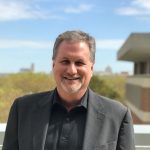 Philip Goff, Chancellor’s Professor of American Studies and Executive Director of the Center for the Study of Religion and American Culture at Indiana University-Purdue University Indianapolis
Philip Goff, Chancellor’s Professor of American Studies and Executive Director of the Center for the Study of Religion and American Culture at Indiana University-Purdue University Indianapolis
Philip Goff, Chancellor’s Professor of American Studies, has been the director of the Center for the Study of Religion and American Culture since 2000. An award-winning teacher, he has written about classroom textbooks and co-edited Themes in Religion and American Culture with Paul Harvey. Dedicated to public teaching, he has been a scriptwriter, consultant, and interviewee for documentaries related to religion in American life for PBS, BBC, and HBO. His most recent books are Civil Religion Today: Religion and the American Nation in the Twenty-First Century (NYU Press, 2021), edited with Rhys Williams and Raymond Haberski, and Religion and Philanthropy in the United States (Indiana University Press, 2022), edited with David P. King.
Panelists
 Andrew Ali Aghapour, Scholar, Journalist, and Comedian
Andrew Ali Aghapour, Scholar, Journalist, and Comedian
Andrew Ali Aghapour (he/him/his) is a scholar and comedian based in Durham, North Carolina. He is the Consulting Scholar of Religion and Science for the Religion in America Initiative at the National Museum of American History, and the co-author, with Peter Manseau, of the forthcoming Discovery and Revelation: Religion, Science, and Technology in America (Smithsonian Books, 2021). Andrew holds a Ph.D in religious studies from UNC Chapel Hill and an M.Phil in the history and philosophy of science from Cambridge University. He is the writer/performer of Zara, a one person show about immigration and the history of monotheism. Andrew was the co-founder, with Michael Schulson, of Religion Dispatches‘ The Cubit, and the managing editor, under Myrna Sheldon, of Harvard Divinity School’s Cosmologics.
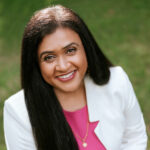 Khyati Y. Joshi, Professor of Education, Fairleigh Dickinson University
Khyati Y. Joshi, Professor of Education, Fairleigh Dickinson University
Khyati Y. Joshi (pronunciation) is a public intellectual whose social science research and community connections inform policy-makers, educators, and everyday people about race, religion, and immigration in 21st century America. She has lectured around the world and published ground-breaking scholarly and popular work in her field, while also serving as an advisor to policy-makers and a leader in the South Asian American community. Her most recent book is White Christian Privilege: The Illusion of Religious Equality in America (NYU Press, 2020). She is also the co-editor of Envisioning Religion, Race, and Asian Americans (University of Hawaii Press, 2020), and was author and co-editor of Teaching for Diversity and Social Justice 3rd edition (Routledge, 2015), one of the most widely-used books by diversity practitioners and social justice scholars alike.
Jeff Sharlet, Frederick Sessions Beebe ’35 Professor in the Art of Writing, Dartmouth College
Jeff Sharlet is a journalist and bestselling author or editor of seven books. His most recent book, combining image and text, is This Brilliant Darkness: A Book of Strangers. He is the winner of the National Magazine Award for Reporting, the Molly Ivins Prize and the Outspoken Award, among others.
2023-25 YSAR Application
Beginning in the fall of 2023, a series of seminars devoted to the enhancement of teaching and research will be offered in Indianapolis. The aims of all sessions of the program are to develop ideas and methods of teaching in a supportive workshop environment, stimulate scholarly research and writing, and create a community of scholars that will continue into the future.
The dates for these seminars are:
- Session I: October 12th-15th, 2023
- Session II: April 11th-April 14th, 2024
- Session III: October 17th-19th, 2024
- Session IV: April 24th-26th, 2025
- Participants will also be expected to join 3 virtual meetings.
Jonathan H. Ebel and Khyati Y. Joshi will lead the 2023-2025 seminars.
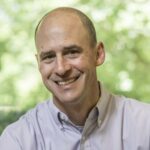 Jonathan H. Ebel has been teaching at the University of Illinois, Urbana-Champaign for seventeen years and currently serves as head of the Department of Religion. His research program involves religion and war, religion and violence, and lay theologies of economic hardship all within the American context. He is the author of From Dust They Came: Government Camps and the Religion of Reform in New Deal California (New York University Press, 2023); G.I. Messiahs: Soldiering, War, and American Civil Religion (Yale, 2015); Faith in the Fight: Religion and the American Soldier in the Great War (Princeton, 2010), and the co-editor with Professor John Carlson of From Jeremiad to Jihad: Religion, Violence, and America (California, 2012). He is currently at work on a religious history of American warfare, told in five weapons. Jon is a past recipient of a fellowship from the John Simon Guggenheim Foundation and a former candidate for U.S. Congress.
Jonathan H. Ebel has been teaching at the University of Illinois, Urbana-Champaign for seventeen years and currently serves as head of the Department of Religion. His research program involves religion and war, religion and violence, and lay theologies of economic hardship all within the American context. He is the author of From Dust They Came: Government Camps and the Religion of Reform in New Deal California (New York University Press, 2023); G.I. Messiahs: Soldiering, War, and American Civil Religion (Yale, 2015); Faith in the Fight: Religion and the American Soldier in the Great War (Princeton, 2010), and the co-editor with Professor John Carlson of From Jeremiad to Jihad: Religion, Violence, and America (California, 2012). He is currently at work on a religious history of American warfare, told in five weapons. Jon is a past recipient of a fellowship from the John Simon Guggenheim Foundation and a former candidate for U.S. Congress.
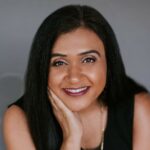 Khyati Y. Joshi is a public intellectual whose social science research and community connections inform educators, thought leaders, and everyday people about race, religion, and immigration in 21st century America. She has lectured around the world and published ground-breaking scholarly and popular work, while also serving as an advisor to policy-makers and a leader in the South Asian American community. Her most recent book, White Christian Privilege: The Illusion of Religious Equality in America (NYU Press, 2020), examines the intersections of race and religion in U.S. history and contemporary social culture. She was also author and co-editor of Teaching for Diversity and Social Justice 3rd edition (Routledge, 2015), one of the most widely-used books by diversity practitioners and social justice scholars alike. Dr. Joshi is a Professor of Education at Fairleigh Dickinson University where she was recognized with the FDU Distinguished Faculty Award for Research and Scholarship in 2014. She is member and past Co-Chair (2008-2011) of the managing board for the Asian Pacific American Religion Research Initiative (APARRI), and serves as co-Principal Investigator on APARRI’s project to support emerging scholars and promote greater public engagement on the religious realities of Asian and Pacific Islander Americans, supported by a $1 million grant from the Luce Foundation.
Khyati Y. Joshi is a public intellectual whose social science research and community connections inform educators, thought leaders, and everyday people about race, religion, and immigration in 21st century America. She has lectured around the world and published ground-breaking scholarly and popular work, while also serving as an advisor to policy-makers and a leader in the South Asian American community. Her most recent book, White Christian Privilege: The Illusion of Religious Equality in America (NYU Press, 2020), examines the intersections of race and religion in U.S. history and contemporary social culture. She was also author and co-editor of Teaching for Diversity and Social Justice 3rd edition (Routledge, 2015), one of the most widely-used books by diversity practitioners and social justice scholars alike. Dr. Joshi is a Professor of Education at Fairleigh Dickinson University where she was recognized with the FDU Distinguished Faculty Award for Research and Scholarship in 2014. She is member and past Co-Chair (2008-2011) of the managing board for the Asian Pacific American Religion Research Initiative (APARRI), and serves as co-Principal Investigator on APARRI’s project to support emerging scholars and promote greater public engagement on the religious realities of Asian and Pacific Islander Americans, supported by a $1 million grant from the Luce Foundation.
Applying to the Young Scholars program:
Scholars eligible to apply are those working in a subfield of the area of religion in North America, broadly understood, who have a terminal degree in hand, a full-time academic position (tenure track or renewable long-term), and have launched their careers within the last seven years. Scholars are selected with the understanding that they will commit to the program for all seminar dates. Participants are expected to produce two course syllabi, with justification of teaching approach, and a publishable research article over the course of their seminars.
Applicants must submit (a) a curriculum vitae; (b) a 750-word essay indicating why they are interested in participating and describing their current and projected research and teaching interests; and (c) email information for three scholars willing to write letters of reference (portfolios with generic reference letters are not accepted).
All application materials, including letters of recommendation, must be received by June 20th. Please note that the Center will not request supporting letters until after the application is submitted so plan accordingly. Click here to apply to the Young Scholars program.
Religion & the Supreme Court
December 9, 2021
Religion and religious freedom are often key themes before the Supreme Court. A 2021 New York Times article went as far as to claim “An Extraordinary Winning Streak for Religion at the Supreme Court.” Both the current docket and the faith traditions of the sitting justices have ignited a series of questions around the issues of disestablishment, free exercise, and the ways race, class, and gender identity interact with each of these bedrock American principles. For instance, does the Supreme Court’s protection of religious freedom undermine equality before the law? Does this protection go beyond what even the Founders intended? Panelists will discuss the justices’ understanding of religion, the ways religion is changing in America, and the impact of these combined variables on American life. How can new scholarship about religion, race, gender identity, and jurisprudence help us interrogate the current moment? How can scholars in these fields help us understand the inflection points that define the relationship between Supreme Court decisions and our shared future? Join humanities and legal scholars for a conversation at the intersection of religion, equality, and the Supreme Court.
Cohosts
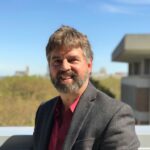 Arthur E. Farnsley, Senior Research Fellow, The Center for the Study of Religion and American Culture
Arthur E. Farnsley, Senior Research Fellow, The Center for the Study of Religion and American Culture
Arthur E. Farnsley is Senior Research Fellow of the Center, Research Director for Religion and Urban Culture 2.0 and data evangelist for the Association of Religion Data Archives. He served as Executive Officer of the Society for the Scientific Study of Religion (SSSR) from 2007-2016. An expert in American religion and civil society, his books include The Bible in American Life (Oxford University Press, 2017), Flea Market Jesus (Cascade Books, 2012); Sacred Circles, Public Squares: The Multicentering of American Religion (Indiana University Press, 2005); Rising Expectations: Urban Congregations, Welfare Reform, and Civic Life (Indiana University, 2003); and Southern Baptist Politics: Authority and Power in the Restructuring of an American Denomination (Pennsylvania State University, 1994). His articles have appeared on the cover of both Christian Century and Christianity Today magazines.
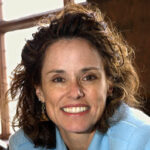 Sarah Barringer Gordon, Arlin M. Adams Professor of Constitutional Law and Professor of History, University of Pennsylvania Carey Law School
Sarah Barringer Gordon, Arlin M. Adams Professor of Constitutional Law and Professor of History, University of Pennsylvania Carey Law School
Sally Gordon is well known for her work on religion in American public life and the law of church and state, especially for the ways that religious liberty developed over the course of American national history. She is a frequent commentator in news media on the constitutional law of religion and debates about religious freedom. Her current book project is Freedom’s Holy Light: Disestablishment in America, 1776-1876, about the historical relationship between religion, politics, and law. Her first book, The Mormon Question: Polygamy and Constitutional Conflict in Nineteenth- Century America (Univ. of North Carolina, 2002), won the Mormon History Association’s and the Utah Historical Society’s best book awards in 2003. Her second book, The Spirit of the Law: Religious Voices and the Constitution in Modern America (Harvard, 2010), explores the world of church and state in the 20th century.
Panelists
Beth Cate, Clinical Associate Professor, O’Neill School of Public and Environmental Affairs, Indiana University, Bloomington
Beth Cate practiced law in the public and private sectors for 20 years. Her expertise includes intellectual property law, data privacy and security, administrative law, compliance and ethics, and constitutional law. With Fred H. Cate, she co-authored “The Supreme Court and Information Privacy” for Bulk Surveillance: Systematic Government Access to Private Sector Data, James X. Dempsey and Fred H. Cate eds. (Oxford Univ. Press 2018). An earlier version of the chapter appeared as an article in the journal International Data Privacy Law. They are currently working on a book about the Supreme Court’s privacy jurisprudence, and she is also working on an article addressing the future of student records privacy. She has authored two entries in Springer’s Global Encyclopedia of Public Administration, Public Policy, and Governance, entitled “Constitutional Rights of Public Employees” and “Constitutional Intersection of Civil Liberty and Public Administration.” She also co-authored, with Andrea Need, “Correcting the System of Unequal Justice,” in Tavis Smiley’s 2016 book Covenant With Black America—Ten Years Later.
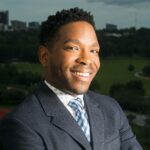 Fred Smith Jr., Associate Professor, Emory University School of Law
Fred Smith Jr., Associate Professor, Emory University School of Law
Fred Smith Jr. is associate professor at Emory University School of Law. He is a scholar of the federal judiciary, constitutional law, and local government. In 2019, he was named Emory Law’s Outstanding Professor of the Year. Smith clerked for Judge Myron Thompson of the Middle District of Alabama; Judge Barrington D. Parker Jr. of the United States Court of Appeals for the Second Circuit; and Justice Sonia Sotomayor of the United States Supreme Court. Prior to teaching, he also worked for Bondurant, Mixson & Elmore LLP in Atlanta. Smith’s research focuses on accountability, federal jurisdiction, and state sovereignty. His work has appeared, or will appear, in Columbia Law Review, Harvard Law Review, Michigan Law Review, New York University Law Review, Notre Dame Law Review, Stanford Law Review, Vanderbilt Law Review, among other academic journals.
https://youtu.be/o3H8BT4kJ0Y
Religion & Mormon Studies
December 15, 2022
The field of Mormon Studies has grown exponentially in recent years, resulting in an explosion of scholarship and the creation of endowed chairs at several universities. In this episode, three leading scholars will discuss the state of the field, considering such questions as: How has Mormon Studies changed our understanding of American religion? Where does the historiography of the Church of Jesus Christ of Latter-day Saints stand in relation to the study of other Mormonisms? Is the term “Mormon” here to stay? How does scholars’ church affiliation (or lack thereof) affect their work? What are some major neglected areas in scholarship?
Panelists
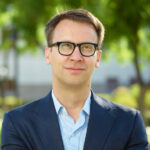 Matthew Bowman, Claremont Graduate University
Matthew Bowman, Claremont Graduate University
Matthew Bowman was appointed the Howard W. Hunter Chair of Mormon Studies, with a joint appointment in history and religion in 2019. He is a specialist in American religious history, with particular interests in Mormonism, new religious movements, and the development of the concept of “religion” in the United States. He teaches courses on North American religions and Mormonism in the department of religion, and on the history of the United States in the department of history. He is the author or co-editor of The Mormon People: The Making of an American Faith (Random House, 2012), Women and Mormonism: Historical and Contemporary Perspectives (University of Utah, 2016), and most recently Christian: The Politics of a Word in America (Harvard University Press, 2018).
Benjamin E. Park, Sam Houston State University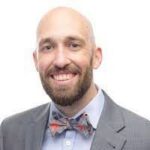
Benjamin Park studies the intersections between religion, culture, and politics in America, mostly during the eighteenth and nineteenth centuries and often within a broader Atlantic context. His first book, American Nationalisms: Conceiving Union in the Age of Revolutions, 1783-1833 (Cambridge University Press, 2018), examines how local contexts influenced ideas of nation and union during the fifty years following political independence. His newest book DNA Mormon: Perspectives on the Legacy of Historian D. Michael Quinn (Signature Books) is set to be released December 2022.
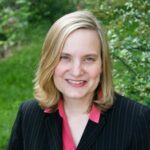 Jana Riess, Religion News Service
Jana Riess, Religion News Service
Since 2008, Jana Riess has been an editor in the publishing industry, primarily working in the areas of religion, history, popular culture, ethics, and biblical studies. From 1999 to 2008, she was the Religion Book Review Editor for Publishers Weekly, and continues to write freelance reviews for PW as well as other publications. She is a senior columnist for Religion News Service. She is the author or co-author of many books, including The Prayer Wheel; Flunking Sainthood; What Would Buffy Do?; Mormonism for Dummies; and The Writer’s Market Guide to Getting Published. Her book The Twible: All the Chapters of the Bible in 140 Characters or Less . . . . Now with 68% More Humor! won first place in the non-fiction category in the Writer’s Digest Annual Self-Published Book Awards. Her book newest book, The Next Mormons: The Rising Generation of Latter-day Saints was released in March 2019 from Oxford University Press.
Host
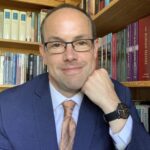 Peter J. Thuesen, Indiana University-Purdue University Indianapolis
Peter J. Thuesen, Indiana University-Purdue University Indianapolis
Peter J. Thuesen is Professor of Religious Studies, co-editor of Religion and American Culture: A Journal of Interpretation, and Director of Humanities Research in the Center for the Study of Religion and American Culture at IUPUI. His latest book, Tornado God: American Religion and Violent Weather (Oxford, 2020), traces how religious views of weather and climate disasters have evolved from the colonial era to Donald Trump. His other books include Predestination: The American Career of a Contentious Doctrine (Oxford, 2009), and In Discordance with the Scriptures: American Protestant Battles over Translating the Bible (Oxford, 1999).
Religion & Grief
April 15, 2021
Given the year we’ve been through—the multiple types of losses and “sadnesses” people have struggled with—it is fitting that we consider the roles of religion in all of this. “Religion & Grief,” however, extends beyond the pandemic, and this discussion will explore the ways scholars of religion and American Studies are theorizing grief, death, suffering, and the rituals that attend to these moments. Have our understandings of grief changed or expanded in this current moment? Do new religious movements or the deeper engagement of groups (like the nones, women of color, victims of racialized or sexual violence) complicate our analysis and narration of grief? Is grief an adequately compelling and capacious term to address the loss and sadness that we theorize in our work? Join humanities and social science scholars as they explore these questions and the larger relationships between religion, ritual, and various types of grief and loss.
Panelists
Candi Cann, Baylor University
Dr. Cann’s research focuses on death and dying, and the impact of remembering (and forgetting) in shaping how lives are recalled, remembered and celebrated. She examined this theme through martyrdom in her early scholarship. Dr. Cann’s first book, Virtual Afterlives: Grieving the Dead in the Twenty-first Century with the University Press of Kentucky (2014), centered on grief and memorialization in the contemporary world. She has also written various chapters and articles on digital death and grief. Her second book Dying to Eat: Cross Cultural Perspectives on Food, Death and the Afterlife (also with University Press of Kentucky, 2017) is an edited collection on the intersection of food in death and grief. Her third book, The Routledge Handbook of Death and Afterlife (Routledge, 2018), is an edited collection containing thirty chapters examining death and afterlife from around the world. Dr. Cann’s current projects are researching diversity in death, and the intersection of death and technology around the world.
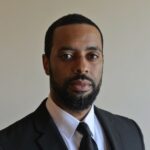
Michael Brandon McCormack, University of Louisville
Dr. McCormack is Associate Professor and Director of Undergraduate Studies at the University of Louisville. His research interests include intersections of Black Religion and Cultural Studies; contested relationships between the prophetic tradition in Black religion, Black moral panic, and the cultural productions of the hip-hop generation; African American Religion and Religions of the African Diaspora.
Cohosts
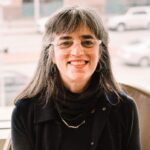
Laura Levitt, Temple University
Laura Levitt is Professor of Religion, Jewish Studies and Gender at Temple University where she has chaired the Religion Department and directed both the Jewish Studies and the Gender, Sexuality and Women’s Studies Programs.
Levitt is the author of The Objects that Remain (Penn State University Press, November 2020); American Jewish Loss after the Holocaust (2007); and Jews and Feminism: The Ambivalent Search for Home (1997). With Laurence Silberstein and Shelley Hornstein, she edited Impossible Images: Contemporary Art After the Holocaust (2003), and with Miriam Peskowitz she edited Judaism Since Gender (1997). Laura Levitt edits NYU Press’s North American Religions Series with Tracy Fessenden (Arizona State University) and David Harrington Watt (Haverford College) .
She currently chairs the Committee on Sexual Misconduct for the Association for Jewish Studies (AJS) and lead the task force that created and implemented the Society’s sexual misconduct policies and procedures.
 Brian Steensland, Indiana University-Purdue University Indianapolis
Brian Steensland, Indiana University-Purdue University Indianapolis
Brian Steensland is Professor and Chair of Sociology and Director of Social Science Research at the Center for the Study of Religion and American Culture at IUPUI. His research interests include religion, culture, politics, and civic life in contemporary America. His books include The New Evangelical Social Engagement (Oxford, 2014), co-edited with Philip Goff, and The Failed Welfare Revolution (Princeton, 2008), which won both the Mary Douglas Prize and the award for Distinguished Contribution to Scholarship in Political Sociology. He has published on topics including religious classification, American evangelicals and contemporary politics, mainline Protestantism and welfare reform, and Christianity and free-market economics. His co-authored article “The Measure of American Religion” (Social Forces, 2000) won the Best Article Award in the Sociology of Religion. His article “Cultural Categories and the American Welfare State” (American Journal of Sociology, 2006) won the Best Article Award in the Sociology of Culture.
Religion & Comics
April 18, 2024
Throughout history, comic books have occupied many roles for religious communities. They continue to do so today. Comics have been mediums for both the positive and negative portrayal of religious belonging. They have served as objects of devotion as well as of controversy and censorship. Some comics are, themselves, religious artifacts. One might approach comics from a literary analytical perspective, identifying and analyzing the theological and otherwise religious themes and characters that appear therein. Join us for a conversation, however, that will discuss comics as sources for the study, teaching, and publication of American religious studies.
Host
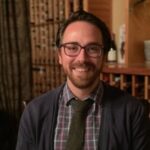 Matthew J. Cressler, Chief of Staff at the Corporation for Public Interest Technology, Independent Scholar
Matthew J. Cressler, Chief of Staff at the Corporation for Public Interest Technology, Independent Scholar
Matthew J. Cressler, Ph.D. is Chief of Staff at the Corporation for Public Interest Technology and an independent scholar of religion, race, and culture. He is the author of Authentically Black and Truly Catholic: The Rise of Black Catholicism in the Great Migrations (NYU, 2017) and numerous peer-reviewed articles on Catholic and African American religious histories, clerical sexual abuse, horror movies, comic books, and more. He has written for America, The Atlantic, National Catholic Reporter, Religion News Service, The Revealer, Slate, U.S. Catholic, and Zocalo Public Square. Together with Adelle M. Banks, he co-reported the Religion News Service series “Beyond the Most Segregated Hour,” which won a Wilbur Award from the Religion Communicators Council. He is the creator of Bad Catholics, Good Trouble (badcatholics-comics.org), an educational webcomic series that brings to vivid life true stories of Catholic injustice and the ordinary people of faith who did extraordinary things to confront white supremacy and colonial violence in their communities.
Panelists
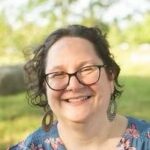 Jenny Caplan, University of Cincinnati
Jenny Caplan, University of Cincinnati
Jenny Caplan is a scholar of American religion and popular culture. She specializes in American Judaism and work extensively with film, television, internet media, humor, graphic novels, video games, board games, and other sites of pop culture engagement. She has been studying religion and religious history since 1997 and has published extensively on media portrayals of Jews and Judaism. Jenny’s book, Funny, You Don’t Look Funny: Judaism and Humor from the Silent Generation to Millennials was published in 2023.
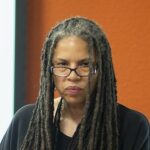 Yvonne Chireau, Swarthmore College
Yvonne Chireau, Swarthmore College
Yvonne Chireau is professor in the department of religion at Swarthmore College, where she teaches courses on theories of religion, Africana religions, and American religious history. She is the author of Black Magic: Religion and the African American Conjuring Tradition (2003) and the co-editor of Black Zion: African American Religions and Judaism (1999). Her varied thoughts on the historical intersections between magic, Africana religions, comics, and popular culture tropes of black spirituality can be found at the research blog The Academic Hoodoo (academichoodoo.com). She is currently co-producing a documentary film about contemporary reclamations of the African American ancestral traditions known as Conjure, Hoodoo, and Rootworking by millennial practitioners, artists, educators, and entrepreneurs.
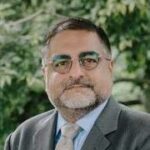 Hussein Rashid, Independent Scholar
Hussein Rashid, Independent Scholar
Hussein Rashid is founder of islamicate, L3C, a consultancy focusing on religious literacy and cultural competency. He works with a variety of NGOs, foundations, non-profits, and governmental agencies for content expertise on religion broadly, with a specialization on Islam. His research focuses on Muslims and American popular culture. He writes and speaks about music, comics, movies, and the blogistan. He has published academic works on Muslims and American Popular Culture, Malcolm X, qawwali, intra-Muslim racism, teaching Shi’ism, Islam and comics, free speech, Sikhs and Islamophobia, Muslims in film, American Muslim spaces of worship, and the role of technology in teaching religion. He co-edited a book on Kamala Khan/Ms. Marvel with Jessica Baldzani called Ms. Marvel’s America: No Normal. He also co-edited The Bloomsbury Handbook of Muslims and Popular Culture with Kristian Petersen, and another volume Islam in North America with Huma Mohibullah. His most recent publication is Teaching Critical Religious Studies co-edited with Jenna Gray-Hildenbrand and Beverley McGuire. He is currently working on a cultural history of Muslims in America. Hussein is on the editorial board of book series Religion and Comics at Claremont Press and is a Cultural Co-Editor for CrossCurrents, The Bloomsbury Studies in Popular Fiction and Religious Dynamics, the Journal of Interreligious Studies. He was on the editorial boards of Religion Dispatches, The Islamic Monthly, and Cyber Orient, in addition to being an emeritus scholar at State of Formation.
Religion & War
February 22nd, 2024
At any moment in the past year, the international news has been filled with stories of increasing global violence and war. Many of these wars are shaped by long-held rivalries, contrasting views of faith and belonging, and the opinions of dispersed communities that far-exceed the borders of the nation-state. Theorists have argued that the historical relationship between war and religion rests on three propositions: first, war creates martyrs; second, war is about the meaning of religion; and third, war is a manifestation of faith. While pithy, each of these propositions captures centuries-long debates that are complex and substantial. In the present, debates about war and whether peace as reality exists will involve how the public and thought leaders characterize the three propositions. Join us as we explore these and other propositions at the intersection of war, religion, and the possibility of peace.
Host
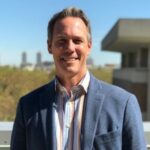 Raymond Haberski, Jr., Professor of History and Director of American Studies, IUPUI
Raymond Haberski, Jr., Professor of History and Director of American Studies, IUPUI
Raymond Haberski, Jr. is Professor of History and Director of American Studies at IUPUI. He also directs the Institute for American Thought and is part of the Center for the Study of Religion and American Culture. For the 2008–2009 academic year he held the Fulbright Danish Distinguished Chair in American Studies at the Copenhagen Business School. Haberski is trained in twentieth century U.S. history with a focus on intellectual history and his books include It’s Only a Movie: Films and Critics in American Culture (2001), Freedom to Offend: How New York Remade Movie Culture (2007), The Miracle Case: Film Censorship and the Supreme Court (2008), God and War: American Civil Religion Since 1945 (2012), Voice of Empathy: A History of Franciscan Media in the United States (2018), with Andrew Hartman, eds., American Labyrinth: Intellectual History for Complicated Times (2018), and with Philip Goff and Rhys Williams, eds., Civil Religion Today (2021). With Andrew Hartman, he is co-host of the podcast Trotsky and Wild Orchids.
Panelists
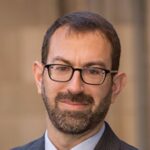 Samuel Moyn, Chancellor Kent Professor of Law and History at Yale University
Samuel Moyn, Chancellor Kent Professor of Law and History at Yale University
His areas of interest in legal scholarship include international law, human rights, the law of war, and legal thought, in both historical and current perspective. In intellectual history, he has worked on a diverse range of subjects, especially twentieth-century European moral and political theory. He has written several books in his fields of European intellectual history and human rights history, including The Last Utopia: Human Rights in History (2010), and edited or coedited a number of others. His most recent books are Christian Human Rights (2015, based on Mellon Distinguished Lectures at the University of Pennsylvania in fall 2014) and Not Enough: Human Rights in an Unequal World (2018). His newest book, Humane: How the United States Abandoned Peace and Reinvented War, appeared with Farrar, Straus, and Giroux in fall 2021. Over the years he has written in venues such as Boston Review, the Chronicle of HigherEducation, Dissent, The Nation, The New Republic, the New York Times, and the Wall Street Journal.
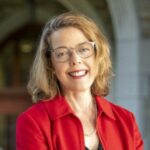 Mary Ellen O’Connell, Robert and Marion Short Professor of Law and Professor of International Peace Studies, Kroc Institute at the University of Notre Dame
Mary Ellen O’Connell, Robert and Marion Short Professor of Law and Professor of International Peace Studies, Kroc Institute at the University of Notre Dame
Mary Ellen O’Connell’s work is in the areas of international law on the use of force, international dispute resolution, and international legal theory. She is the author or editor of numerous books, including, most recently, The Art of Law in the International Community (Cambridge University Press, May 2019; paperback 2020) and Self-Defence Against Non-State Actors (with Tams and Tladi, Cambridge University Press, July 2019). Professor O’Connell served as a Title X professional military educator for the U.S. Department of Defense in Germany and was also an associate attorney in private practice with the international law firm of Covington & Burling in Washington, D.C.
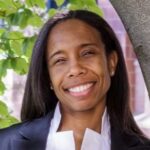 Kate E. Temoney, Associate Professor and Chair of the Department of Religion, Montclair State University
Kate E. Temoney, Associate Professor and Chair of the Department of Religion, Montclair State University
Dr. Kate E. Temoney is Associate Professor and Chair of the Department of Religion at Montclair State University. She is the American Academy of Religion co-chair of the Religion, Holocaust, and Genocide Unit; a member of the United States Holocaust Memorial Museum Committee on Ethics, Religion, and the Holocaust, and an Editor for Genocide Studies and Prevention: An International Journal. Dr. Temoney teaches courses on Religious Ethics, the Holocaust, Genocide, African Religions, Religions of the World, and Religion & Human Rights, and her international publications and presentations—in such places as Brazil, Cambodia, Poland, Belgium, Morocco, Canada, and Australia—address the intersections of religion, human rights, mass atrocities, and theory of history. A selection of her work includes: “An Assessment of the Plan of Action for Religious Leaders and Actors to Prevent Incitement to Violence that Could Lead to Atrocity Crimes” in the Routledge Handbook on Religion and Genocide (Routledge, 2022); and “Religion and Genocide Studies” in The Handbook of Genocide Studies (Edward Elgar Press, forthcoming).
